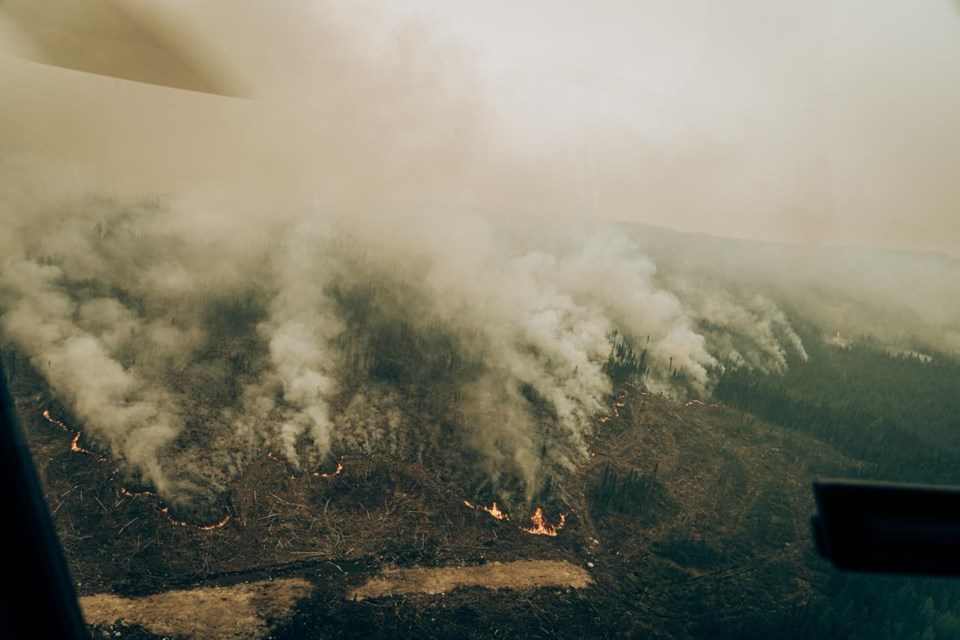Hundreds of wildfires continue to rage in Canada as storms forecast across the country could bring much-needed rain, but also the risk of powerful winds and lightning. Here's a look at developments Tuesday:
Rain needed but not enough: Environment Canada
Precipitation is forecast across the country, which could provide some reprieve to those battling a record wildfire season, but Environment Canada says it's not enough to extinguish the danger.
Sara Hoffman, a meteorologist with Environment Canada, says the country entered wildfire season extremely dry and the amount of rain forecast for June is less than normal.
She says the amount of rain expected this week will not make widespread changes to the level of risk this wildfire season.
The changing weather this week throughout Western Canada is also expected to move wildfire smoke into more densely populated areas of the Prairies, especially Alberta, and also portions of the southeast B.C. Interior.
There are 447 active fires in Canada with 226 listed as out of control.
All wildfires in Nova Scotia under control
All the wildfires in Nova Scotia are now under control, more than two weeks after an unprecedented string of fires broke out in the southwestern corner of the province and the Halifax area.
The provincial government says the huge Barrington Lake wildfire in Shelburne County, which started May 27, has finally been tamed.
It became the largest wildfire in the province's history after growing to more than 235 square kilometres, forcing more than 6,000 people from their homes and destroying 60 houses and cottages, as well as 150 other structures.
Firefighters were still on the ground walking through the area, kicking over rocks and examining stumps as two helicopters flew over, sending back records of high-heat areas from their sensors.
Spokesman Dave Steeves says it's monotonous work but key to avoiding having the fire carry on threatening the southern part of the province.
Nova Scotia has also lifted a provincewide burn ban that was put in place at the end of May after a wildfire started in the suburbs north of Halifax, forcing 16,000 people to flee and destroying 151 homes and dozens of other structures.
Rain could bolster Quebec firefighting efforts
Quebec's public security minister says a rainy forecast is raising hopes that the province's more than 7,200 fire evacuees will be able to return home in the coming days.
François Bonnardel says rain showers and cooler temperatures should be moving into northwestern Quebec.
Powerful forest fires in that region have threatened the towns of Lebel-sur-Quévillon and Normétal.
Bonnardel says the fire effort is being bolstered by the arrival this week of two contingents of American firefighters, with more reinforcements from Spain and Portugal expected to arrive Wednesday.
Colder weather could help fire battle near Alberta town
An out-of-control fire continues to pose a danger to the community of Edson, west of Edmonton, but officials are hopeful changing temperatures will help firefighters battling the blaze.
The town's chief administrative officer, Christine Beveridge, says cooler temperatures and some precipitation are in the forecast for the area in the coming days.
A low was forecast to develop over central Alberta this afternoon, bringing winds up to 30 kilometres per hour and the potential for up to 30 millimetres of rain.
Beveridge says, however, the 2,042-square-kilometre fire remains 1.5 km from the community, and its 8,400 residents remain under an evacuation order.
Beveridge says the area also remains extremely smoky and fire crews are working around the clock to stop the fire from spreading closer to the community.
Storm expected in northeast B.C.
Another storm is forecast to move into northeastern British Columbia where officials describe a "volatile and rapidly evolving" wildfire situation.
Environment Canada says the system could dump up to 25 mm of rain over the parched Peace River region, but thunderstorms are forecast later in the day, followed by winds gusting to 60 km/h.
Hundreds of people were forced from their homes or are under an evacuation alert as the 4,800-square-kilometre blaze continues to burn.
The fire doubled in size in the last eight days and is now the second largest wildfire in B.C. history.
The same weather system also spawned severe thunderstorm watches for a large part of southeastern B.C., a wind warning for the west side of Vancouver Island and special weather statements for most other central and southern regions.
The BC Wildfire Service says 77 active wildfires are currently burning in the province.
B.C. highway cut by fire won't open for 10 days
A key highway on Vancouver Island that was cut off by wildfire activity will remain shut for at least another 10 days and may not be fully open until mid-July.
A small but aggressive fire is burning out of control on steep hills above Highway 4, closing the only paved link to Port Alberni, Tofino and Ucluelet.
Communities have been relying on a long, rough detour to get supplies including fuel and food.
The B.C. Ministry of Transport says crews are working to make the highway safe by clearing debris and dangerous trees before installing protective measures, including a temporary wall to shield drivers from falling rubble.
The ministry says a phased reopening with single-lane-alternating-traffic could open by June 24.
This report by The Canadian Press was first published June 13, 2023.
The Canadian Press



